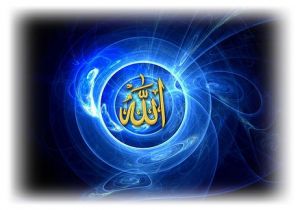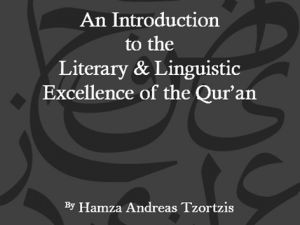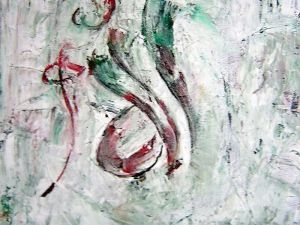Short Biography Of The Prophet Muhammad (Peace & Blessings Be Upon Him) The Prophets Birth: Muhammad, son of Abdullah, son of Abdul Muttalib, of the tribe of Quraysh, was born in Makkah in the year 571 C.E. His father died before he was born, and he was raised first by his grandfather, Abdul Muttalib, and after his grandfathers death, by his uncle Abu Talib. As a young boy he travelled with his uncle in the merchants caravan to Syria, and some years later made the same journey in the service of a wealthy widow named Khadijah. So faithfully he conducted her business, and so excellent was the report of his behaviour, which she received from her old servant who had accompanied him, that she soon afterwards married her young agent; and the marriage proved a very happy one, though she was fifteen years older than he was. Throughout the twenty-six years of their life together he remained devoted to her; and after her death, when he took other wives he always mentioned her with the greatest love and reverence. This marriage gave him rank among the notables of Makkah, while his conduct earned for him the title al-Amin, the trustworthy.
The Prophets Birth: Muhammad, son of Abdullah, son of Abdul Muttalib, of the tribe of Quraysh, was born in Makkah in the year 571 C.E. His father died before he was born, and he was raised first by his grandfather, Abdul Muttalib, and after his grandfathers death, by his uncle Abu Talib. As a young boy he travelled with his uncle in the merchants caravan to Syria, and some years later made the same journey in the service of a wealthy widow named Khadijah. So faithfully he conducted her business, and so excellent was the report of his behaviour, which she received from her old servant who had accompanied him, that she soon afterwards married her young agent; and the marriage proved a very happy one, though she was fifteen years older than he was. Throughout the twenty-six years of their life together he remained devoted to her; and after her death, when he took other wives he always mentioned her with the greatest love and reverence. This marriage gave him rank among the notables of Makkah, while his conduct earned for him the title al-Amin, the trustworthy.
The Origin of Life - an Islamic Perspective Science must increase our faith. It is wrong for anyone to close their eyes to what is right in front of them. For a Muslim the evidence of dinosaurs and fossils is not a threat to our beliefs. Rather, it is a confirmation of the power of Allah.
Science must increase our faith. It is wrong for anyone to close their eyes to what is right in front of them. For a Muslim the evidence of dinosaurs and fossils is not a threat to our beliefs. Rather, it is a confirmation of the power of Allah.
A. Why Does Allah Tell Us About the Creation?
The Holy Qur'an is the book given to us by the Creator of the Universe. Allah, (literally: THE God) which is His personal Name, knows us best and is aware that humans can be very skeptical creatures.
Allah points out, "...if you were to seek a tunnel into the earth or a ladder into the skies and bring them a sign, (they still wouldn't be convinced.) If it were Allah's will, He could gather them all into true guidance, so don't be among those who are influenced by ignorance." (6:35)
Allah, the Keeper of Wisdom, makes it a point to give as many proofs in the Qur'an about His existence and creative abilities as possible so the maximum number of humans can be guided. We need proof, and Allah gives us that proof. (2:26, 40:57)
Allah, of course, does not need us to follow Him, or believe in Him. As He states, "Allah can do without them and Allah is free of all needs." (64:6)
He merely wishes that people would choose to believe in Him so He can reward them for their choice. Allah is ready to forgive even those who acted wrongly if they but ask for His forgiveness.
The Qur'an's Challenge: A Literary & Linguistic Miracle "Read! In the Name of your Lord Who has created. He has created man from a leech-like clot. Read! And your Lord is the Most Generous. Who has taught (the writing) by the pen. He has taught man that which he knew not." Surah Al-'Alaq (The Clot) 96: 1-5
"Read! In the Name of your Lord Who has created. He has created man from a leech-like clot. Read! And your Lord is the Most Generous. Who has taught (the writing) by the pen. He has taught man that which he knew not." Surah Al-'Alaq (The Clot) 96: 1-5
These were the first verses of the Qur'an to be revealed to Prophet Muhammad (upon whom be peace) over fourteen hundred years ago. Prophet Muhammad, who was known to have been in retreat and meditation in a cave outside Makkah, had received the first revelation of a book that would have a tremendous impact on the world. Not being able to read or write or known to have composed any piece of poetry and not having any special rhetorical gifts, Prophet Muhammad had just received the beginning of a book that would deal with matters of belief, law, politics, rituals, spirituality, and economics in an entirely new literary form.
This unique literary form is part of the miraculous nature of the Qur'an, that led to the dramatic intellectual revival of desert Arabs. Thirteen years after the first revelation, it became the primary reference for a new state in Madinah, providing the new civilisation's political, philosophical, and spiritual outlook. In this chapter, we will begin to examine why the Qur'an is impossible to imitate by reviewing how the language of the Qur'an compares to the normal literary forms of Arabic poetry and prose. Understanding the unique literary form of the Qur'an, provides an essential insight into its miraculous nature.
How Do We Know God is One? A Philosophical & Theological Perspective One of the many common questions that were asked during the Islamic Awareness Tour was "If God does exist what reasons do we have to believe He is one?" This question is important as it addresses a fundamental concept in Islamic theology, the concept of oneness. The oneness of God, in Arabic tawhid, is a central theme in the Qur'an and a message of all of the Prophets, the Qur'an eloquently describes the nature of God and His oneness in the 112th chapter, "Say: He is God, the One. God the Eternal. He begot no one nor was He begotten. No one is comparable to him."
One of the many common questions that were asked during the Islamic Awareness Tour was "If God does exist what reasons do we have to believe He is one?" This question is important as it addresses a fundamental concept in Islamic theology, the concept of oneness. The oneness of God, in Arabic tawhid, is a central theme in the Qur'an and a message of all of the Prophets, the Qur'an eloquently describes the nature of God and His oneness in the 112th chapter, "Say: He is God, the One. God the Eternal. He begot no one nor was He begotten. No one is comparable to him."
Before I begin to answer the question, it is important to add that the concept of oneness in Islam is not limited to God's singularity and uniqueness. There are many aspects to this concept which involve the way human beings should worship God, how they should understand His lordship, and how they should understand God's names and attributes. It doesn't stop there as these ideas transform an individual's world view and outlook, as a famous Asian-subcontinent thinker once wrote,
"A believer in this...can never be narrow in outlook. He believes in a God Who is the Creator of the heavens and the earth, the Master of the East and the West and Sustainer of the entire universe. After this belief he does not regard anything in the world as a stranger to himself. He looks on everything in the universe as belonging to the same Lord he himself belongs to. His sympathy, love and service are not confined to any particular sphere or group. His vision is enlarged, his intellectual horizon widens, and his outlook becomes as liberal and as boundless as is the Kingdom of God. How can this width of vision and breadth of mind be achieved by an atheist, a polytheist or one who believes in a deity supposed to possess limited and defective powers like a man?"
Test The Message
 The Prophet Muhammad (peace be upon him) claimed prophet-hood over 1400 years ago. His message was simple:
The Prophet Muhammad (peace be upon him) claimed prophet-hood over 1400 years ago. His message was simple:
‘There is none to be worshipped but God and he (Muhammad) was the Messenger of God’.
To test whether this claim is true we must rationally investigate the historical narratives and testimonies concerning the life of the Prophet (peace be upon him).
Once we do this, we will be in a position to come to a balanced conclusion in this regard.
In epistemology (which is narrowly defined as the study of knowledge and belief) testimony is considered to be one of the sources of knowledge, and when applied correctly, can form justified beliefs. Testimony is a valid source of knowledge only when it comes from a reliable source, especially if there are multiple sources in agreement. Obviously there are conditions as to how we can use testimony, but in the majority of cases, testimony is considered a valid source of knowledge.
